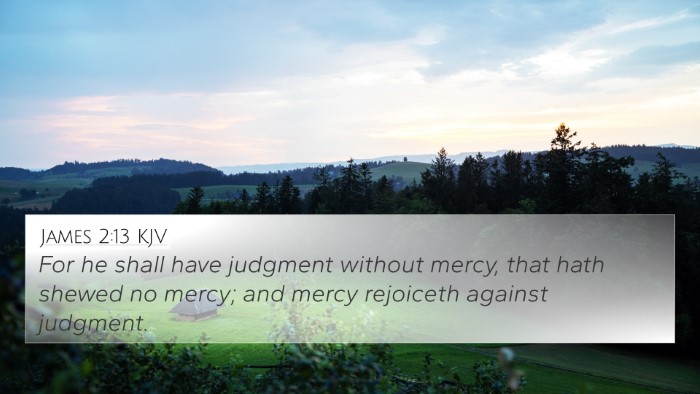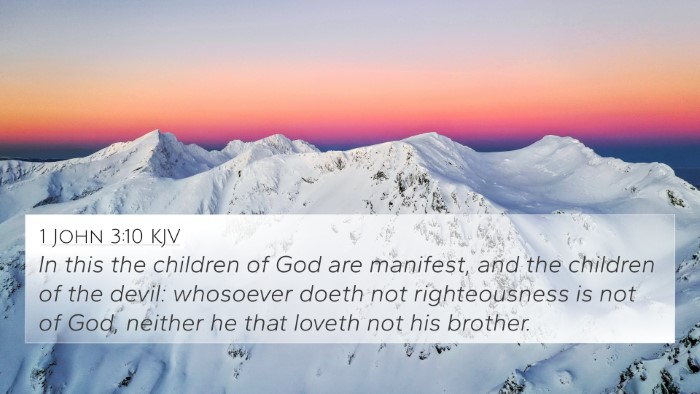Understanding Matthew 6:14
Verse Summary: Matthew 6:14 states, “For if you forgive other people when they sin against you, your heavenly Father will also forgive you.” This verse emphasizes the critical connection between forgiveness sought from God and the forgiveness extended to others.
Verse Meaning and Insights
This verse encapsulates a fundamental principle of the Christian faith: the necessity of forgiving others as a reflection of one's own receipt of divine forgiveness.
Matthew Henry's Commentary
Matthew Henry notes that forgiveness is a central theme in the teachings of Jesus. He asserts that true forgiveness involves a heart that is willing to release others from the debts of sin they owe us, mirroring God’s grace towards humanity. Henry stresses that our forgiveness from God is contingent upon our behavior towards others — highlighting an essential condition for receiving mercy.
Albert Barnes' Commentary
Albert Barnes elaborates on the reciprocal nature of forgiveness in this verse. He suggests that it is not merely a condition for receiving forgiveness but a demonstration of genuine faith in Christ. Barnes indicates that the expectation of forgiveness is part of the moral order established by God: if we fail to forgive, we risk alienating ourselves from divine mercy.
Adam Clarke's Commentary
Adam Clarke highlights that forgiveness is a choice. Clarke emphasizes the need for believers to engage actively in the process of forgiving others, not only to align with God's will but for the health of their spiritual lives. He warns that harboring grudges can lead to spiritual decay, thus reiterating that forgiving others liberates one’s spirit while also pleasing God.
Cross-References and Connections
This verse shares thematic connections with several other passages in Scripture, emphasizing the importance of forgiveness. Here are some key cross-references:
- Matthew 18:21-22: Peter asks how many times he should forgive someone, and Jesus responds that it should be “seventy times seven.” This underscores the limitless nature of forgiveness.
- Luke 6:37: “Do not judge, and you will not be judged. Do not condemn, and you will not be condemned. Forgive, and you will be forgiven.” This reinforces the mutual nature of forgiveness and judgment.
- Mark 11:25: Jesus emphasizes the need to forgive others before praying, indicating that our spiritual lives are interconnected with our relationships.
- Colossians 3:13: “Bearing with one another and forgiving each other, if anyone has a complaint against another.” The Apostle Paul directly connects interpersonal forgiveness with Christian community life.
- Ephesians 4:32: “Be kind and compassionate to one another, forgiving each other, just as in Christ God forgave you.” This verse directly correlates divine forgiveness with the expectation of mutual forgiveness among believers.
- James 2:13: “Judgment without mercy will be shown to anyone who has not been merciful.” This verse serves as a solemn reminder that showing mercy is crucial in obtaining mercy.
- 1 John 1:9: “If we confess our sins, he is faithful and just and will forgive us our sins and purify us from all unrighteousness.” This highlights the assurance of God’s forgiveness in response to our repentance.
- Matthew 5:7: “Blessed are the merciful, for they will be shown mercy.” This verse declares the blessings associated with showing mercy, further reinforcing the theme of forgiveness.
- Matthew 7:1-2: “Do not judge, or you too will be judged. For in the same way you judge others, you will be judged.” This passage ties the act of forgiving others with the principle of reciprocity in judgment.
- Luke 17:3-4: Jesus instructs the disciples to forgive even if someone sins against them seven times in one day; this teaches the perseverance required in forgiveness.
Thematic Connections and Practical Applications
The emphasis on forgiveness found in Matthew 6:14 encourages believers to cultivate a forgiving nature and understand its implications in their spiritual life. Here are some practical applications:
- Self-Reflection: Regularly evaluate personal attitudes towards others and seek to forgive those who have wronged you.
- Engagement in Community: Actively participate in church and community activities promoting reconciliation, fostering an environment of grace.
- Prayer for Strength: Seek God's strength to forgive, especially in challenging situations where forgiveness feels particularly difficult.
- Educating Others: Share insights about the importance of forgiveness, inspiring others to pursue reconciliation in their relationships.
Conclusion
In conclusion, Matthew 6:14 serves as a profound reminder of the divine link between God's forgiveness and our obligation to forgive others. The inter-Biblical dialogue around this theme reveals how critical forgiveness is to the Christian faith. By embracing this teaching, believers not only align themselves with God's will but also promote healing and peace within their communities.
Further Study and Tools for Cross-Referencing
For those interested in deeper study, consider utilizing various tools for Bible cross-referencing such as:
- Bible Concordance: A helpful resource for locating verses and themes.
- Bible Cross-Reference Guide: Offers insights into scriptural parallels.
- Bible Chain References: Connects verses on specific themes throughout the Bible.











